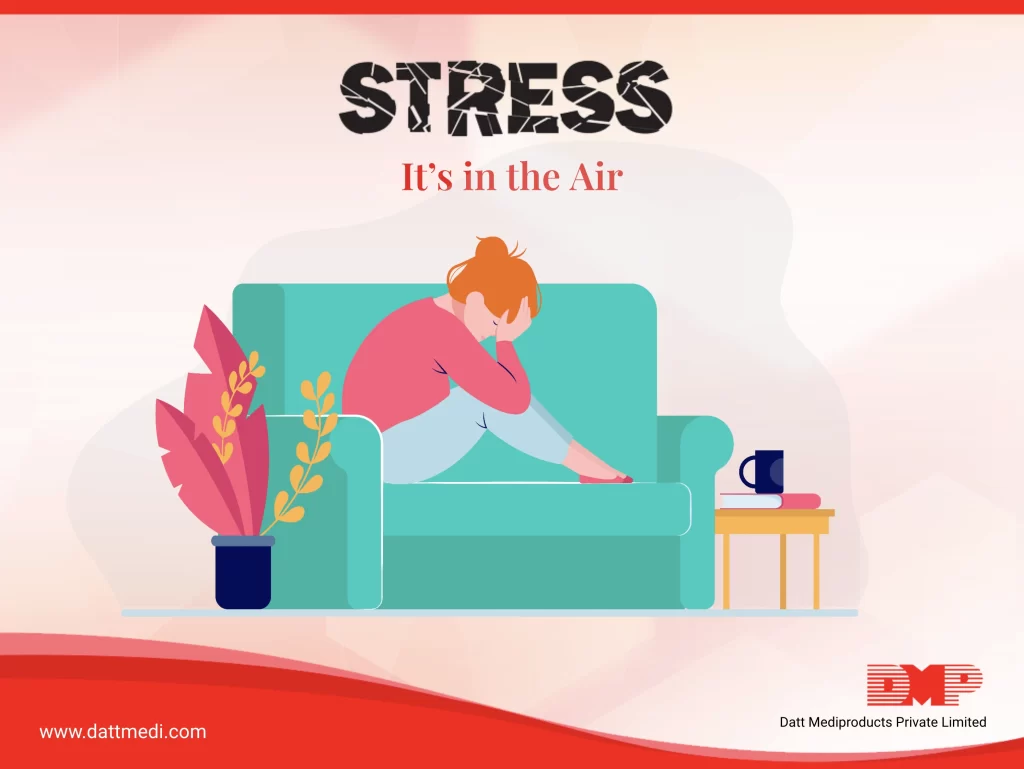
Stress includes physical, emotional and intellectual responses of human body towards any changes or challenges. These responses are normal and help a human body to adapt to new situations. A positive stress can help your body to work harder with an improved performance. Stress becomes unhealthy when it upsets your day to day functioning and there is no period of relaxation or relief in between.
Physical symptoms may include headaches, dizziness, exhaustion, aches, chest pain, high blood pressure, gastrointestinal issues, muscle tension and a weak immune system.
Stress is not a mental health problem. But, stress can cause mental health problems such as anxiety, irritability, depression, panic attacks or sadness. Contrariwise, mental health problems can cause stress too.
TYPES OF STRESS
1. Acute Stress: This is a short term stress which helps you manage difficult situations. Acute stress can occur when you do something new or exciting. However, in difficult situations such as any episodes of crime or accident witness, acute stress can become severe. Common symptoms include emotional distress, muscle tension, headache, back pain, stomach upset, rapid heartbeat or a raised blood pressure. Occasional and moderate acute stress doesn’t affect mental health. But, when you have it more frequently, there might be some issues. This is called episodic acute stress.
2. Episodic Acute Stress: Frequent and recurrent experiences of acute stress comprise an episode acute stress. You may feel under continuous pressure and exhausted, both physically & mentally. Ultimately, your behaviour towards others is going to be affected and if left untreated, episodic acute stress can result in irritability, problems in relationships, unintended hostility etc. Handling episodic acute stress requires certain lifestyle changes, and a reduction in the amount of expectations you have from others and vice versa.
3. Chronic Stress: Chronic stress is an ongoing stress which lasts for a longer period of time. Reasons could be ongoing problems in one’s life such as a distressed marriage, trouble in work life, health issues or money problems. There is no time in between the episodes for recovery.
HEALTHY WAYS TO COPE WITH STRESS
People with chronic stress indulge in certain unhealthy behaviours in order to manage it. These could be Alcoholism, Gambling, Overeating or developing an eating disorder, shopping or internet browsing, Smoking, or even Drug addiction. Thereby stress management becomes of paramount importance.
Following stress management techniques persistently can help you avoid most physical, emotional and behavioral symptoms of stress.
1. The first step involved in Stress management is to RECOGNISE STRESSORS. Everyone feels stressed in one or the other way. Understand the situations that cause stress. Once the root cause is identified, different ways can be followed to deal with your stressors.
2. Avoid unhealthy stress relief behaviours (as mentioned in above para) as these hurt more than they help.
3. Recognize things that can’t be changed, accept that there is nothing you can do about them, let go and do not get upset.
Find Healthy Stress Busters:
1. Exercise whenever you feel any episode of stress affecting you. Indulge in any kind of physical activity. This would release the feel-good neurotransmitters and help you release the built up energy and frustration. Even a short walk can do wonders.
2. Positive Attitude is the key towards challenges. Change your outlook and try to replace negative thoughts with more positive ones.
3. Do something which you enjoy doing such as read a book, listen to your favourite tracks, watch a movie, talk to a friend or spend time with nature.
4. If you have too much on your plate which causes stress, then learn to set limits and say no for accepting everything. Try seeking help from others if needed.
We @dattmediproducts recommend learning and practicing new relaxation techniques to handle stress. These relaxation techniques can be meditation, yoga, deep breathing exercises and tai chi. These work wonders to slow down an accelerated heart rate and lower blood pressure. We strongly propose seeking a professional help from a counsellor or a therapist if you can’t manage stress on your own.
Be Happy, Stay Healthy!




